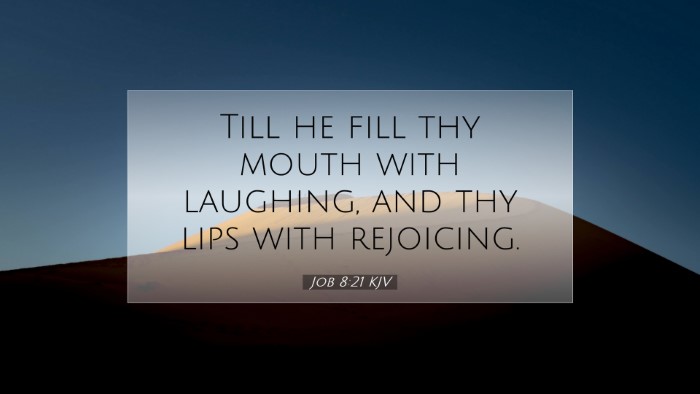Old Testament
Genesis Exodus Leviticus Numbers Deuteronomy Joshua Judges Ruth 1 Samuel 2 Samuel 1 Kings 2 Kings 1 Chronicles 2 Chronicles Ezra Nehemiah Esther Job Psalms Proverbs Ecclesiastes Song of Solomon Isaiah Jeremiah Lamentations Ezekiel Daniel Hosea Joel Amos Obadiah Jonah Micah Nahum Habakkuk Zephaniah Haggai Zechariah MalachiJob 8:21
Job 8:21 KJV
Till he fill thy mouth with laughing, and thy lips with rejoicing.
Job 8:21 Bible Commentary
Commentary on Job 8:21
Job 8:21 (KJV): "Till he fill thy mouth with laughing, and thy lips with rejoicing."
Introduction
The Book of Job stands as one of the most profound writings in the biblical corpus, addressing the complex issues of suffering, divine justice, and human faith. In this particular verse, Bildad the Shuhite responds to Job, offering a blend of traditional wisdom and poignant, albeit simplistic, comfort. This commentary aims to synthesize insights from notable public domain scholars such as Matthew Henry, Albert Barnes, and Adam Clarke to unpack the theological and practical implications of Job 8:21.
Contextual Analysis
Before delving into the verse itself, it is essential to consider its broader context within Job's discourse. Bildad's speech comes after Job’s lamentation over his suffering, providing a response steeped in his understanding of retributive justice – the belief that good is rewarded and evil is punished. This perspective sets the stage for his exhortation toward repentance and hope in divine restoration.
Matthew Henry's Insight
Matthew Henry, in his comprehensive commentary, emphasizes the dual themes of divine mercy and human repentance. He notes that Bildad's assertion of joy—"fill thy mouth with laughing"—is an invitation to Job to embrace a hopeful outlook, trusting in God's promise of restoration. Henry posits that this represents a pastoral approach aimed at urging Job to return to a state of blessing, suggesting that the re-establishment of joy is contingent upon Job's alignment with divine expectations.
Henry further elaborates that the laughter and rejoicing that Bildad speaks of are not mere superficial expressions but signify profound internal transformation and restoration. He draws a parallel with the Psalmist's anticipation of joy in the wake of tears (Psalm 126:5), emphasizing the cyclical nature of sorrow leading to joy as a divine promise.
Albert Barnes' Perspective
Albert Barnes provides a more critical approach to Bildad's response, analyzing the implications of his message on the moral state of humanity. Barnes indicates that while Bildad asserts the certainty of divine retribution, he overlooks the nuance of Job's situation—namely, Job's innocence and the depth of his suffering.
According to Barnes, the laughter and rejoicing that Bildad refers to should be understood not only as the end goal of divine favor but also as a challenge to Job’s current suffering. Barnes argues that Bildad's theology is simplistic; it fails to acknowledge the complexities of God's governance of the world. Consequently, although the promise of joy is rooted in truth, its application in Job's specific scenario feels hollow and dismissive. This invites readers to reflect on the pastoral care required when addressing the woes of fellow believers.
Adam Clarke's Commentary
Adam Clarke approaches Job 8:21 with an emphasis on the restorative nature of God’s actions in the life of the believer. He interprets Bildad's words as a prophetic declaration of hope, suggesting that God’s desire is to not only restore but to overflow the hearts of the faithful with joy. Clarke highlights that 'filling the mouth with laughter' is an imagery of abundant joy, reflective of God's rich blessings upon those who turn back to Him in sincerity.
Moreover, Clarke elucidates the Hebrew language used in this verse, which connotes the idea of God actively engaging with humanity to bring about such revival. He stresses that while Bildad’s counsel is aimed at Job, it carries a broader principle that resonates across time; that turning towards God brings restoration and joy, irrespective of one’s prior sufferings.
Theological Implications
The theological implications of Job 8:21 are significant for understanding how we navigate suffering and divine justice. Together, the insights of Henry, Barnes, and Clarke expose the delicate interplay between human response to suffering and God's redemptive work. While Bildad’s comments reflect a traditional belief in retribution, they also raise essential questions about the nature of faith during trials.
- Faith and Suffering: The promise of laughter and joy is not merely aspirational but is rooted in the character of God as a redeemer. It challenges believers to maintain hope even in long seasons of despair.
- Divine Justice vs. Human Experience: The discussions surrounding Job's innocence challenge the believer’s understanding of justice. It serves as a reminder that human perception of justice may not align with divine purposes.
- Restoration and Reconciliation: The implication that joy is a result of reconciliation with God serves as a vital theological point, urging believers to seek closeness to God even amidst struggle.
Practical Application
For pastors, students, and theologians, Job 8:21 provides a robust framework for pastoral care and the teaching of hope amidst pain. It invites reflection on how to minister effectively to individuals in grief and distress. The following applications can be drawn from this commentary:
- Encouragement of Genuine Repentance: Emphasize the importance of turning back to God, not just as a means to end suffering but as a pathway to true joy.
- Addressing Simplistic Comfort: Be mindful of the complexities of suffering; provide comfort that acknowledges the reality of pain while pointing toward hope in God.
- Promoting a Theology of Joy: Encourage a deeper understanding of God’s desire to restore joy, which can be a vital encouragement for those who feel lost in their grief.
Conclusion
In summary, Job 8:21 serves as a poignant reminder of the hope that resides in God’s redemptive nature. The combined insights from Matthew Henry, Albert Barnes, and Adam Clarke illuminate the multifaceted dimensions of suffering, justice, and joy. As believers grapple with their own experiences, this verse continues to beckon us towards a faith that seeks God’s restoration, rejoicing in the promise that He ultimately desires to fill our mouths with laughter and our lips with rejoicing.


